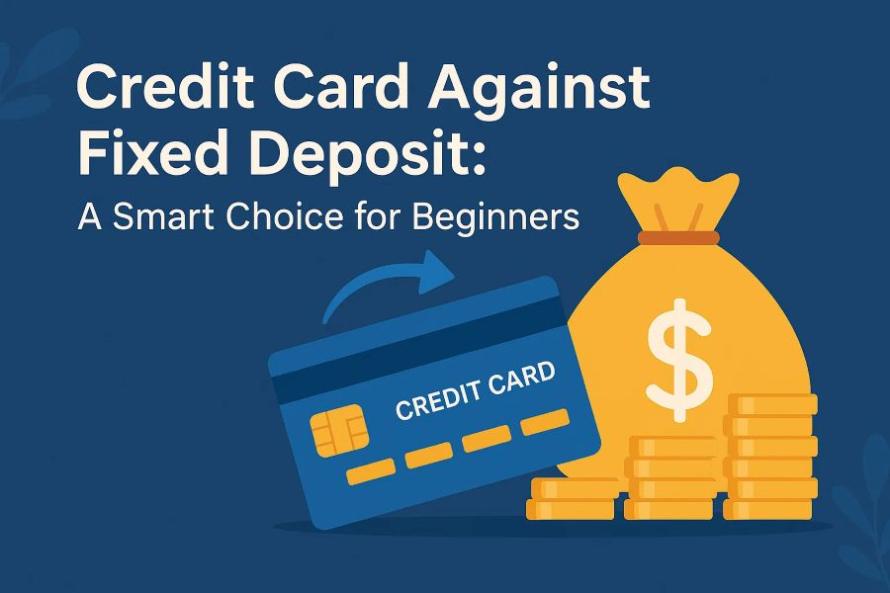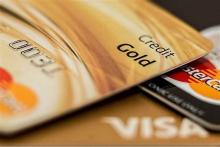Credit Card Against Fixed Deposit: A Smart Choice for Beginners

If you've ever applied for a credit card and got rejected because of no credit history or regular income, there's a simple solution you might not know about: a credit card against a fixed deposit. It’s an easy and safe way to get a credit card even if you're just starting out with your finances.
Let’s walk through how this works and why it can be a smart move.
What is a Credit Card Against Fixed Deposit?
A credit card against a fixed deposit, also known as a secured credit card, is a card that a bank gives you in exchange for keeping a fixed deposit (FD) with them. Instead of checking your income or credit score, the bank takes your FD as security.
For example, if you place ₹20,000 in an FD, the bank might give you a credit card with a limit of around ₹15,000 to ₹17,000. This gives you spending power while your money is still safely earning interest.
Who Should Consider This Type of Card?
This type of credit card is especially useful for:
- Students who don’t have a regular income
- New earners who haven’t built a credit score yet
- Freelancers or gig workers with irregular income
- Homemakers without a salary
- Anyone who has a low or no credit score
If you're in any of these situations, getting a secured credit card can help you start building a credit history.
Why It’s a Good Option
One of the biggest advantages of a credit card against FD is how easy it is to get. You don’t need to submit salary slips, tax returns, or other financial documents. The fixed deposit itself is enough to qualify. It also helps you build or improve your credit score. As long as you use the card responsibly and pay your bills on time, your credit profile will grow stronger. This makes it easier to get loans or better credit cards in the future.
Another benefit is that your FD keeps earning interest. You’re not locking your money away for nothing—it still grows while acting as a backup for your card. Since the bank already has your money as security, they are more comfortable approving your application. Many of these cards also come with low or no annual fees.
Which Banks Offer These Cards?
Here are a few options available in India:
- SBI Card Unnati – Requires a minimum FD of ₹25,000. No annual fee for the first four years and no credit score is needed.
- HDFC Bank Credit Card Against FD – Needs a minimum FD of ₹15,000. Offers cashback, reward points, and EMI options.
- Axis Bank Insta Easy Credit Card – Starts with an FD of ₹20,000. Instant approval without income proof.
- Kotak 811 DreamDifferent Card – Requires just ₹10,000 in FD. Lifetime free with a simple application process.
- IDFC FIRST WOW Credit Card – Offers a credit limit equal to 100% of your FD. Lifetime free and no hidden charges.
Each bank has its own features, so it’s a good idea to compare before applying.
Who Can Apply?
Most people can apply as long as they meet these basic conditions:
- You are 18 years or older
- You can open a fixed deposit (usually ₹10,000 or more)
- You have basic documents like PAN and Aadhaar
You don’t need a job, income proof, or a credit score to get started.
How to Apply for a Credit Card Against a Fixed Deposit
A credit card issued against a fixed deposit—commonly known as a secured credit card—is an ideal option for individuals with limited or no credit history. It provides the convenience and features of a regular credit card, while being backed by a fixed deposit held with the issuing bank. The fixed deposit acts as collateral and mitigates the risk for the lender.
For Individuals Without an Existing Fixed Deposit
If you do not currently hold a fixed deposit (FD) account with the bank, the first step in obtaining a secured credit card is to initiate the opening of a fixed deposit account. This is a prerequisite, as the secured credit card is issued based on the FD.
Application Process:
- Visit the Bank Branch: Begin by visiting the nearest branch of the bank offering secured credit cards.
- Open a Fixed Deposit Account: You will need to complete the account opening formalities and deposit the required amount. Most banks have a minimum FD amount, typically starting from ₹10,000, but this can vary depending on the institution.
- Inquire About Credit Card Issuance: In many cases, once the FD is successfully created, the bank may offer the secured credit card as a bundled or complimentary product. However, in other cases, a formal application may be required.
- Submit Credit Card Application: If the card is not issued automatically, you can fill out a secured credit card application form at the branch.
- Online Application (Post FD Activation): Once your fixed deposit is active and visible in the bank's system, some banks also provide the option to apply for the credit card through their official website or mobile app.
For Existing FD Account Holders
If you already have a fixed deposit with the bank from which you intend to obtain a secured credit card, the process is more straightforward.
Steps to Follow:
- Visit the Bank’s Website or App:
Most banks allow existing FD holders to apply online for a secured credit card. - Complete the Online Application Form:
Fill in the required details and link your existing FD to the credit card request. - Verification and Issuance:
The bank will verify your FD details and initiate the issuance process for the secured credit card.
Documentation Requirements
The documentation needed to apply for a secured credit card largely depends on whether or not you already have an FD account with the bank.
If You Already Hold an FD with the Bank:
- No Additional Documentation Required:
The bank will use the KYC (Know Your Customer) documents you previously submitted while opening the FD. - Reverification May Be Conducted:
The bank may verify the validity of your existing KYC documents, especially to confirm your current residential address.
If You Are Opening a New FD Account:
- KYC Documents Must Be Submitted:
To open the FD account and process the credit card application, you will be required to submit the following:- Proof of Identity:
Acceptable documents typically include Aadhaar Card, PAN Card, Passport, Voter ID, or Driving License. - Proof of Address:
This may include utility bills, passport, bank statement with address, or a rental agreement.
- Proof of Identity:
- Once the FD is opened and activated, your credit card application can be processed using the same documentation.
Things to Keep in Mind
While this kind of credit card is helpful, there are a few things to be careful about.
First, always pay your bills on time. If you don’t, the bank has the right to take the money from your FD. That can also damage your credit score.
Second, your fixed deposit is locked in while the credit card is active. If you want to withdraw the FD early, you may need to close the credit card.
Also, read the fine print. Some cards still charge interest and late payment fees if you don’t pay the full amount. Just because it’s a secured card doesn’t mean it’s free of all costs.
Lastly, the credit limit depends on how much money you put in the FD. A bigger deposit means a higher credit limit.
Final Thoughts
A credit card against a fixed deposit is a great starting point for people who are new to credit. It gives you the benefits of a regular credit card without needing a job or a credit score. At the same time, your money stays safe and continues to earn interest.
As long as you pay on time and manage the card well, this can be your first step toward building a solid financial future.




Leave a Reply